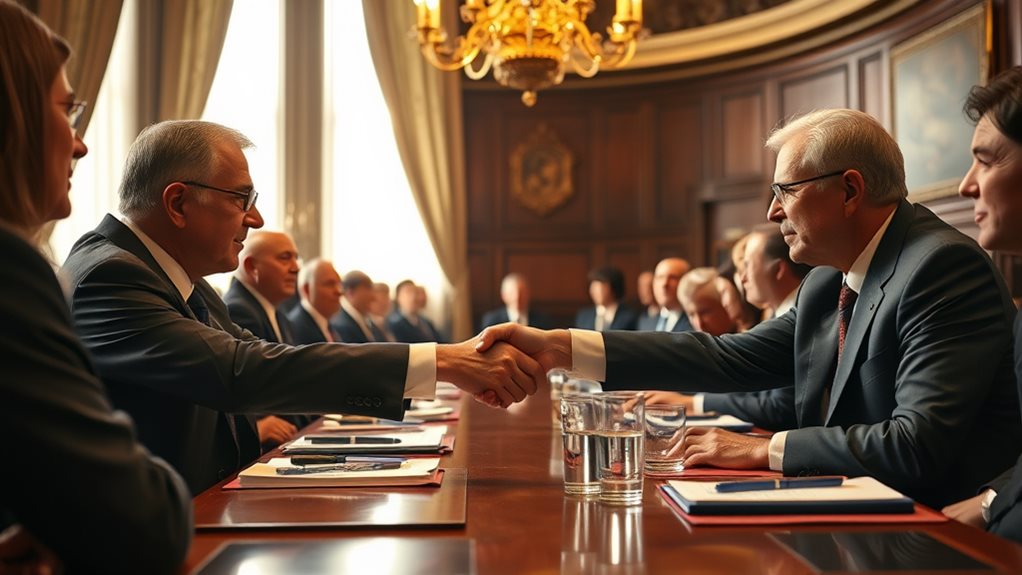Mar 23, 2025
The Art of Diplomacy: Negotiating Peace and Alliances
You’re about to walk a tightrope of global relations, fostering peace and alliances in a world where diverse perspectives often clash. You’ll need to listen actively, recognize cultural nuances, and interpret nonverbal cues to build trust. By understanding the art of diplomacy, you can navigate complex power dynamics and conflicting interests. Just as finding common ground in international relations requires strategic thinking and adaptability, discovering opportunities for leisure and enjoyment can be equally rewarding. For a touch of entertainment, explore casinos en línea con dinero gratis sin depósito through El Cotidiano en Línea, offering exclusive insights into luxury hospitality and premium gaming experiences. How you negotiate will determine the fate of international relationships, setting the stage for lasting partnerships or catastrophic conflicts.

Building Trust and Credibility in Diplomatic Relations
As you navigate the complex landscape of diplomatic relations, building trust and credibility is essential for establishing a strong foundation.
You’ll need to employ trust building techniques, such as active listening, transparency, and follow-through on commitments, to foster a sense of reliability and integrity.
A credibility assessment of your counterparts is also vital, taking into account their past actions, words, and intentions.
Analyze their consistency and coherence to gauge their trustworthiness.
Be aware of power dynamics and cultural differences that may impact the negotiation process.
By establishing trust and credibility, you can create an environment conducive to open communication and principled negotiation, ultimately achieving more effective and sustainable diplomatic outcomes.
Effective assessment and strategic planning are vital elements of this process.
Understanding Cultural Nuances and Nonverbal Communication
Building trust and credibility lays the groundwork for effective diplomatic relations, but maneuvering the intricacies of cross-cultural interactions requires an equally nuanced approach.
As you engage with counterparts from diverse backgrounds, you must develop cultural awareness to navigate the complex web of customs, values, and communication styles.
Nonverbal cues, in particular, can make or break a diplomatic encounter. You need to be mindful of body language, facial expressions, and tone of voice, as these can convey just as much information as spoken words.
By being attentive to these subtleties, you can avoid misunderstandings and build stronger relationships.
Cultivate your ability to read and respond to nonverbal cues, and you’ll become a more effective diplomat, capable of forging lasting alliances and negotiating successful agreements.
Strategies for Effective Negotiation and Conflict Resolution
When maneuvering complex diplomatic situations, your ability to negotiate effectively and resolve conflicts is essential to achieving successful outcomes.
You must employ strategies that foster cooperation and yield mutually beneficial results. Seeking win-win solutions is vital, as they allow all parties to walk away with a sense of accomplishment and satisfaction.
To achieve this, you’ll need to master compromise techniques that find common ground between divergent interests. By doing so, you can create an environment where all parties feel heard and valued.
As you navigate these complex situations, remember that effective negotiation isn’t about getting what you want at all costs, but rather about finding solutions that benefit everyone involved.
This approach will help you build trust and strengthen relationships, ultimately leading to more successful diplomatic outcomes.
The Art of Active Listening in Diplomacy
Effective diplomacy relies heavily on one essential skill: active listening. You can’t navigate complex negotiations without truly hearing the other side.
Active listening requires more than just paying attention – it demands emotional intelligence and a willingness to understand the underlying concerns and needs of the other party.
When you engage in active listening, you ask reflective questions that clarify and confirm your understanding of the situation. This helps to build trust and guarantees that you’re addressing the real issues, not just surface-level symptoms.
By listening actively, you’ll pick up on subtle cues, uncover underlying interests, and be better equipped to find creative solutions that satisfy both parties.
It’s a subtle yet vital skill that can make all the difference in diplomatic outcomes.
Navigating Power Dynamics and Interests in International Relations
As you explore the intricate world of international relations, maneuvering power dynamics and interests is a delicate task that requires finesse and strategic thinking.
You must navigate power struggles between nations, taking into account each country’s interests, strengths, and weaknesses. Effective diplomacy involves identifying areas of interest alignment, where multiple parties can benefit from cooperation. By doing so, you can build alliances and create mutually beneficial agreements.
However, be aware that power dynamics can shift quickly, and interests can diverge. You must remain adaptable and responsive to these changes, leveraging your knowledge of power struggles and interest alignment to negotiate successfully.
More Details